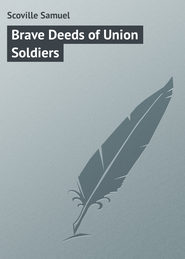 Полная версия
Полная версияBrave Deeds of Union Soldiers
One of the most devoted deeds of courage in the war is chronicled last. On July 21, 1861, the first great battle of the war was fought at Bull Run, Virginia, not far from the federal capital. It was a disastrous day. Unorganized, commanded by inexperienced officers, that battle soon became the shameful rout which for a long time was the basis of the belief throughout the South that one Southerner could whip four Northerners.
Charles J. Murphy was quartermaster on that day in the 38th New York Infantry. It was not his business to fight. He was there to feed and look after his men and it was no more his duty to join the battle than that of the surgeons, the band, or any of the other non-combatants which accompany a regiment. When, however, he saw the masses of beaten, discouraged, panic-stricken men straggling back, Murphy made up his mind that the rear was no place for him. Seizing a rifle which one of the retreating men had thrown away, he rushed forward and did all that one man could to stop the retreat, fighting as long and as hard as he could. It was beyond his power. His regiment were bewildered, confused and broke and fled like sheep, leaving hundreds of wounded men on the field. Murphy made up his mind that he would have no part or lot in this rout and also that he would not desert his wounded comrades, for in those days there were terrible tales rife of how the Confederates treated wounded soldiers. The Union fighters had not yet learned that their antagonists were the same brave, fair fighters that they were. Murphy stayed behind. When the victorious Confederate forces marched down the field, they found it held by one man who was giving water to the wounded and doing his clumsy best to staunch the flowing blood from many a ghastly wound.
"Do you surrender?" shouted the first officer who approached him.
"Not if you are going to hurt these wounded men," said Murphy, bringing his bayonet into position.
"We will take just as good care of them as we will of our own," the officer assured him, and only on this assurance did Murphy surrender. He spent years in Rebel prisons, but no prison could ever take away from him the recollection that he alone had refused to retreat on that disastrous day and that he had risked his life and given up his liberty to save his wounded comrades.
So ends, with these little stories of sudden hero-acts wrought by commonplace men in a matter-of-fact manner, this chronicle of a few of the many, many brave deeds done by our forefathers in a war that was fought for an ideal. Read them, boys and girls, in these war-days that we may remember anew the lessons which the lives and deaths of our kin hold for us. If the day ever comes when we too must fight for ideals which other nations have forgotten or have trampled upon, may we show ourselves worthy of the great heritage of honor which our forefathers have handed down to us.



